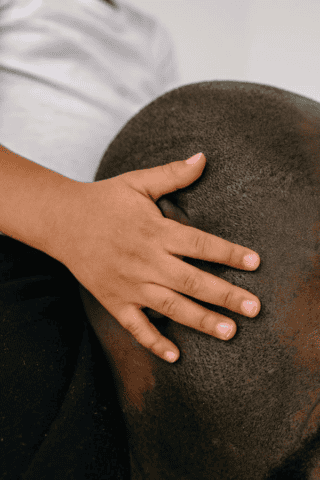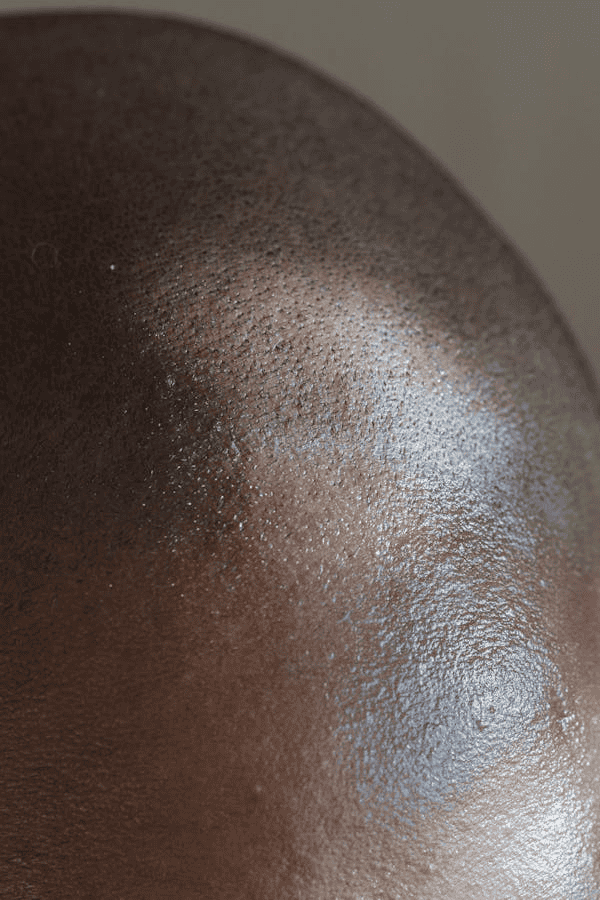Scalp eczema is a common condition that can affect anyone, regardless of their hair type. However, individuals with Black hair may face some unique challenges when it comes to managing and caring for their scalp eczema.
In this article, we will explore the causes, symptoms, and treatment options for scalp eczema in Black hair, as well as provide some helpful care tips to prevent and manage this condition.

Understanding Scalp Eczema
Scalp eczema, also known as seborrheic dermatitis, is a chronic inflammatory skin condition that primarily affects the scalp. It is characterized by redness, itching, and flaking. Scalp eczema can be caused by a combination of genetic, environmental, and lifestyle factors.
What Is Scalp Eczema?
Scalp eczema is a type of eczema that specifically affects the scalp. It is characterized by red, itchy patches on the scalp, as well as scales or flakes that may resemble dandruff. These symptoms can be accompanied by a burning sensation or soreness.
Causes and Symptoms of Scalp Eczema
There are several factors that can contribute to the development of scalp eczema. These include:
- Genetics: Individuals with a family history of eczema or other allergic conditions are more likely to develop scalp eczema.
- Environmental factors: Certain environmental conditions, such as cold weather, dry air, or exposure to harsh chemicals, can trigger or worsen scalp eczema.
- Hormonal changes: Hormonal fluctuations, such as those that occur during puberty or pregnancy, can trigger scalp eczema.
- Stress: Stress can weaken the immune system and trigger flare-ups of scalp eczema.
The symptoms of scalp eczema can vary from person to person, but commonly include:
- Red, inflamed patches on the scalp
- Itching and discomfort
- Scales or flakes that may resemble dandruff
- Dryness and tightness of the scalp
While scalp eczema is primarily associated with the scalp, it can also affect other areas of the body. In some cases, individuals with scalp eczema may experience eczema on their face, ears, or even their chest. This can be particularly distressing for those who struggle with self-confidence and body image.
Managing scalp eczema can be challenging, but there are several treatment options available. Topical creams or ointments containing corticosteroids are commonly prescribed to reduce inflammation and itching. In addition, medicated shampoos containing ingredients like ketoconazole or selenium sulfide can help control the symptoms of scalp eczema.
It is important to note that scalp eczema is a chronic condition, meaning that it can come and go over time. While it may not be possible to completely cure scalp eczema, with proper management and care, individuals can find relief from their symptoms and improve their quality of life.
The Relationship Between Scalp Eczema and Black Hair
Black hair has unique characteristics that make it more susceptible to scalp eczema. The tightly coiled nature of Black hair can make it difficult for the scalp’s natural oils to distribute evenly, leading to dryness and irritation. Additionally, the use of certain hair care products that contain harsh chemicals can further exacerbate scalp eczema in individuals with Black hair.
Why Black Hair is More Susceptible
Black hair tends to be drier and more prone to breakage than other hair types. This dryness can make the scalp more vulnerable to irritation and inflammation, increasing the risk of developing scalp eczema. Additionally, the use of relaxers, hair dyes, and other chemical treatments can further weaken the scalp’s natural barriers and increase the likelihood of scalp eczema.
Furthermore, the unique structure of Black hair follicles can contribute to the susceptibility of scalp eczema. The twists and turns of the hair shaft can create pockets where dead skin cells, oils, and product buildup can accumulate, providing a breeding ground for bacteria and fungi that can trigger or worsen scalp eczema.
The Impact of Scalp Eczema on Black Hair
Scalp eczema can have a significant impact on the health and appearance of Black hair. The itching and inflammation associated with scalp eczema can lead to hair loss or thinning, as well as breakage. Furthermore, the presence of scalp eczema can make it more challenging to maintain and style Black hair, as certain hair care practices may further aggravate the condition.
In addition to affecting the hair itself, scalp eczema can also impact the overall health of the scalp. The constant itching and scratching that often accompany scalp eczema can damage the skin barrier, leading to open sores and increasing the risk of infection. This compromised scalp health can further exacerbate the symptoms of scalp eczema and create a cycle of irritation and discomfort.
Prevention Strategies for Scalp Eczema in Black Hair
While scalp eczema cannot always be prevented, there are several strategies that individuals with Black hair can employ to reduce their risk of developing this condition.
Scalp eczema, also known as seborrheic dermatitis, is a common skin condition that causes redness, itching, and flaking of the scalp. It can be particularly challenging for individuals with Black hair, as the natural oils produced by the scalp may not distribute as easily along the hair shaft, leading to dryness and irritation.
Healthy Hair Care Habits
Establishing a regular hair care routine is essential for maintaining a healthy scalp and preventing scalp eczema. This includes:
- Gentle cleansing: Use a mild, sulfate-free shampoo to cleanse the scalp and hair. Avoid excessive scrubbing or scratching, as this can further irritate the scalp.
- Regular moisturization: Moisturize the scalp and hair regularly to prevent dryness and itching. Look for products that contain natural oils or ingredients like aloe vera.
- Protective styling: Avoid tight hairstyles that pull on the scalp, as this can cause irritation and inflammation. Opt for loose braids, twists, or buns instead.
In addition to these habits, incorporating scalp massages into your routine can help improve blood circulation to the scalp, promoting hair growth and overall scalp health. Massaging the scalp with nourishing oils like coconut or jojoba oil can also provide added moisture and relief from itching.
Choosing the Right Hair Products
When selecting hair care products, it is essential to choose those that are specifically formulated for sensitive or eczema-prone scalps. Look for products that are free of harsh chemicals, such as sulfates, parabens, and fragrances. Additionally, avoid overusing styling products and limit the use of heat styling tools, as these can further dry out the scalp.
Furthermore, incorporating a clarifying shampoo into your routine once a month can help remove product buildup and excess oils from the scalp, preventing clogged pores and potential flare-ups of scalp eczema. It is important to read product labels carefully and opt for gentle, nourishing ingredients that support scalp health.
Treatment Options for Scalp Eczema in Black Hair
Managing scalp eczema requires a multimodal approach that combines self-care measures with medical treatments. Here are some treatment options to consider:
Over-the-Counter Solutions
There are several over-the-counter products available that can help alleviate the symptoms of scalp eczema. These include medicated shampoos that contain ingredients like coal tar, salicylic acid, or ketoconazole. These ingredients can help reduce inflammation and remove excess scales or flakes from the scalp. It is essential to follow the instructions provided and consult a healthcare professional if symptoms persist.
Additionally, incorporating natural remedies such as tea tree oil or aloe vera gel may provide soothing effects for the scalp. These natural ingredients have anti-inflammatory and moisturizing properties that can help in managing scalp eczema. However, it is important to perform a patch test before using these remedies extensively to ensure no adverse reactions.
Prescription Treatments
In severe cases, a healthcare professional may prescribe stronger medications to manage scalp eczema. These can include topical corticosteroids, antifungal creams, or immunomodulators. It is crucial to use these medications as directed and follow up with the healthcare professional for monitoring and adjustments.
In cases where scalp eczema is resistant to conventional treatments, phototherapy may be recommended. This treatment involves exposing the scalp to controlled amounts of ultraviolet light to reduce inflammation and itchiness. Phototherapy should only be administered under medical supervision to prevent potential side effects such as sunburn or skin damage.

Lifestyle Changes to Manage Scalp Eczema
In addition to medical treatments, certain lifestyle changes can help manage scalp eczema and reduce flare-ups.
Diet and Nutrition
Eating a balanced diet that is rich in antioxidants and essential nutrients can support overall skin health, including the scalp. Incorporate foods like fruits, vegetables, whole grains, and lean proteins into your diet. Additionally, stay hydrated by drinking plenty of water throughout the day.
Stress Management and Sleep
Stress can exacerbate scalp eczema symptoms, so it is crucial to find healthy ways to manage stress and prioritize sleep. Engaging in stress-reducing activities like yoga, meditation, or exercise can help promote relaxation and improve overall well-being. Additionally, prioritize getting enough sleep each night to ensure optimal skin health.
When it comes to scalp eczema, it’s important to consider the impact of environmental factors as well. Exposure to harsh chemicals, extreme temperatures, and pollution can all trigger or worsen eczema symptoms. Protect your scalp by wearing a hat in extreme weather conditions and using gentle, fragrance-free hair care products.
Furthermore, maintaining good scalp hygiene is essential for managing eczema. Regularly wash your hair with a mild, moisturizing shampoo and avoid using hot water, which can strip the scalp of its natural oils. Gently towel dry your hair after washing and avoid vigorous scrubbing, as this can irritate the skin.

